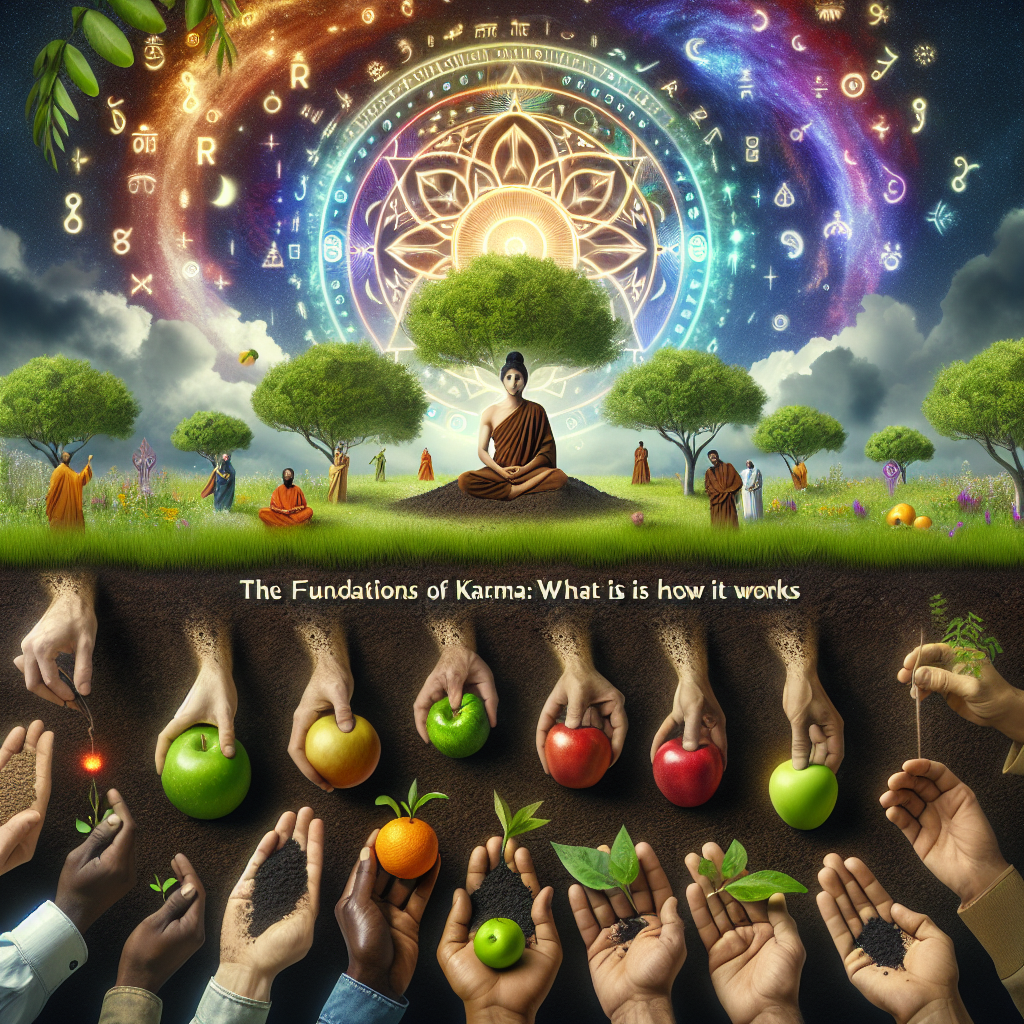Karma is a concept that is deeply rooted in various spiritual traditions, particularly in Hinduism, Buddhism, and Jainism. While its interpretations can vary widely across different cultures, the fundamental tenets of karma revolve around the ideas of action, accountability, and cyclical consequences. In this article, we will delve into the origins of karma, its philosophical underpinnings, how it manifests in daily life, and its implications for personal development and spiritual growth.
Understanding Karma: Definition and Origins
The word ‘karma’ is derived from the Sanskrit word ‘karmā’, which means “action” or “deed.” In essence, karma refers to the universal law of cause and effect, where every action, thought, or intention creates an energy that inevitably returns to the doer. This idea suggests that our present circumstances are shaped by our past actions, while our future is influenced by our current behaviors.
Karma has its roots in ancient Indian philosophy, where it was systematized through textual references such as the Vedas, Upanishads, and later Buddhist and Jain scriptures. Most notably, the Bhagavad Gita discusses the concept of karmic duty and the importance of selfless actions.
Karma in Different Cultures and Traditions
While karma predominantly originates from Indian spiritual traditions, similar concepts can be found in various cultures around the world. Here are a few notable interpretations:
- Buddhism: In Buddhism, karma is interpreted not just as action but as an intention behind the action. It emphasizes the importance of mindfulness, urging individuals to act with wholesome intentions to cultivate positive karma.
- Jainism: Jain beliefs hold that karma is a physical substance that attaches to the soul as a result of one’s actions, impacting their cycle of rebirths. It stresses the importance of non-violence and truthfulness to purify one’s soul of karmic matter.
- Western Thought: Elements similar to karma can be found in Western philosophies, such as the concept of “what goes around comes around,” which embodies the belief in moral causation.
The Mechanism of Karma: How It Works
The workings of karma can be understood through several key principles:
1. The Law of Cause and Effect
At the heart of karma lies the law of cause and effect, a fundamental principle that asserts that every action has consequences. In ethical terms, positive actions yield positive outcomes, while negative actions lead to adverse repercussions. This principle encourages individuals to take responsibility for their actions.
2. Intent and Action
In the context of karma, intention is paramount. Different actions infused with varying intentions can result in different karmic outcomes. For instance, an act of kindness performed with pure intentions generates positive karma, but the same act done for selfish reasons may not yield the same positive effects.
3. The Cycles of Karma
Karma operates in cycles; it is not linear. The impact of actions may manifest immediately or may take time to come to fruition, potentially stretching across multiple lifetimes. This cyclical nature emphasizes patience and understanding regarding life events and personal challenges.
4. The Interconnectedness of All Beings
Karma underscores the interconnected nature of all beings. Our actions not only affect us but also others around us, reinforcing the idea that we exist in a web of relationships. This interconnectedness fosters empathy and compassion, urging individuals to act considerately.
Karmic Outcomes: Positive and Negative Effects
While karma is often perceived in binary terms—good or bad—the truth is more nuanced. Here’s a breakdown of how karmic outcomes manifest:
Positive Karma
Positive karma is cultivated through virtuous actions, selflessness, compassion, and ethical living. Examples include:
- Acts of charity and kindness.
- Helping those in need without expecting anything in return.
- Promoting peace and understanding among communities.
Individuals who cultivate positive karma often experience a sense of fulfillment, healthy relationships, and a supportive environment around them.
Negative Karma
Conversely, negative karma arises from actions rooted in selfishness, harm, deceit, and neglect. Examples include:
- Causing harm or distress to others.
- Engaging in dishonest or unethical behavior.
- Neglecting responsibilities towards family, community, or self.
Negative karma can lead to feelings of guilt, fear, and result in adverse circumstances in one’s life.
The Role of Self-Reflection and Personal Growth
Karma emphasizes self-reflection as a tool for personal growth. Engaging in introspection allows individuals to:
- Recognize and understand the motives behind their actions.
- Identify patterns of behavior that lead to positive or negative karmic outcomes.
- Make conscious choices that align with their values and beliefs, thereby cultivating positive karma.
Strategies for Cultivating Positive Karma
To actively cultivate positive karma, consider the following practices:
1. Mindfulness and Awareness
Practicing mindfulness fosters awareness of your thoughts and actions. It encourages you to act deliberately rather than react unconsciously, leading to more mindful decisions.
2. Selfless Service
Engaging in selfless acts, whether through volunteer work or simple acts of kindness, helps cultivate positive karma. The intent behind the action is what matters most.
3. Compassion and Empathy
Emphasizing compassion towards others creates ripples of positivity. Understanding the struggles of others enhances your moral and emotional landscape.
4. Personal Accountability
Taking responsibility for your actions is crucial. Acknowledge your mistakes and learn from them, allowing for personal growth and better future decisions.
The Impact of Karma on Relationships
Karma plays a significant role in shaping relationships. The energies we cultivate through our actions often reflect in our interactions with others. Positive karma, nurtured through goodwill and kindness, can enhance the quality of your relationships, leading to deeper connections. On the contrary, unresolved negative karma can create barriers, manifesting as misunderstandings or conflicts. Recognizing this interconnectivity encourages individuals to nurture healthier and more loving relationships.
Karma and Reincarnation
A prominent aspect of karma in Hinduism and Buddhism is its link to the concept of reincarnation. According to these beliefs, souls go through cycles of birth, life, death, and rebirth. The accumulated karma from past lives influences the circumstances of one’s current birth. Positive karma might result in favorable conditions, whereas negative karma could lead to challenges or adversities in this life. Understanding this connection provides a deeper appreciation for the importance of living consciously and morally, as one’s choices impact future existences.
Conclusion
In conclusion, karma serves as a guiding principle for individual actions and their impacts, fostering a sense of responsibility and interconnectedness among all beings. Understanding the foundations of karma not only aids in personal development but also enriches our interactions with the world. The cultivation of positive karma through thoughtful actions, compassion, and self-awareness encourages a harmonious existence and paves the way for personal growth and spiritual evolution. As we navigate our lives, let us remember that the world reflects our actions, and through positive intentions, we can create a reality imbued with love, empathy, and righteousness.
FAQs
1. What is karma?
Karma is a spiritual and philosophical concept that refers to the law of cause and effect, where every action, thought, or intention leads to corresponding consequences. It serves as a guide for moral behavior, emphasizing accountability for one’s actions.
2. Does karma only apply to actions?
While actions are significant, karma also heavily considers the intention behind those actions. Positive intentions can lead to positive outcomes, whereas negative or selfish intentions may have adverse effects.
3. Can karma affect my current life situation?
Yes, karma is believed to influence your present circumstances based on past actions. Cultivating positive karma through virtuous deeds can lead to favorable situations in your current life.
4. How can I cultivate positive karma in my life?
You can cultivate positive karma by engaging in selfless acts, practicing compassion and empathy towards others, being mindful of your actions and their intentions, and taking personal responsibility for your choices.
5. Is karma related to reincarnation?
Yes, in many spiritual traditions, particularly Hinduism and Buddhism, karma is intrinsically linked to the concept of reincarnation. It suggests that the deeds of past lives influence one’s current and future existences.
6. Can negative karma be changed?
While negative karma can affect your life, it can also be transformed through conscious decisions and positive actions. Acknowledging past mistakes and making amends can help in mitigating negative karma.
It seems like you entered “Prompt” but didn’t provide any additional context or details. Could you please specify what you’d like help with? It could be a writing prompt, a question, or any topic you’re interested in discussing!, 1736654353, the-foundations-of-karma-what-it-is-and-how-it-works





